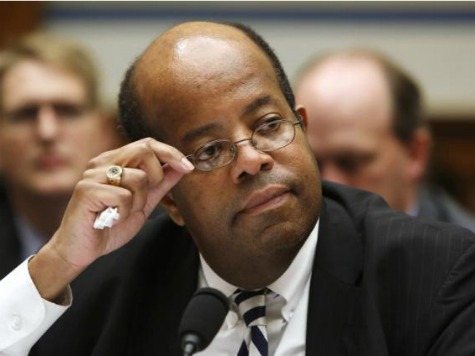
J. Russell George, the Treasury Department’s inspector general for tax administration and author of the May 14 TIGTA report on Tea Party targeting by the IRS, sent a letter dated Wednesday to Congressman Sandy Levin (D-MI) in which he stated, “Our audit did not find evidence that the IRS used the ‘progressives’ identifier as selection criteria for potential political cases between May 2010 and May 2012.”
According to George, “In total, 30 percent of the organizations we identified with the words ‘progress’ or ‘progressive’ in their names were processed as potential political cases. In comparison, our audit found that 100 percent of the tax-exempt applications with ‘Tea Party,’ ‘Patriots,’ or ‘9/12’ in their names were processed as potential political cases during the timeframe of our audit.”
George concluded, “While we have multiple sources of information corroborating the use of Tea Party and other related criteria we described in our report, including employee interviews, emails and other documents, we found no indication in any of these other materials that ‘progressives’ was a term used to refer cases for scrutiny for political campaign intervention.”
George’s letter was in response to a written request made by Congressman Levin on Tuesday. Levin asked that George “explain why he released an audit report on May 14 that omits vital information regarding the processing of tax-exemption applications by the IRS and why he subsequently failed to disclose this information in congressional hearings. “
Specifically, Levin asked, “Why did your report not identify that liberal organizations were also included among the 298 applications you reviewed?”
“TIGTA did not make any characterizations of any organizations in its audit report as conservative or liberal and believes it would be inappropriate for a nonpartisan Inspector General to make such judgments,” George responded. “Instead, our audit focused on the testing of 296 of the 298 potential political cases (two case files were incomplete) to determine if they were selected using the actual criteria that should have been used by the IRS from the beginning to screen potential political cases.”
George found that during the two year period he studied between May 2010 and May 2012, 20 groups with the ‘progressives’ identifier filed for tax exempt status with the IRS. Of these 20, only six were flagged for inclusion in the group of 296 applications identified as potential political cases.
Of these six, the IRS moved none from the “potential” category to be processed as political cases. Processing an application as a political case means that the IRS believes there is evidence the group was engaged predominantly in political campaign activity and therefore not eligible for 501 c 3 tax exempt status.
In contrast, 96 groups with the identifiers “Tea Party,” “patriots,” and “9/12” applied for tax exempt status during the same time period. All 96 were flagged as potential political cases. The TIGTA report did not provide exact details of the number of these 96 cases that were processed as political cases. However, they comprised about one-third of the 296 applications classified as potential political cases. Of these 296, 69% were processed by the IRS as political cases.
Democrats have attempted to undermine George’s report by claiming he failed to address purported IRS targeting of progressive groups, but George’s letter makes it clear that no such targeting comparable to what conservative groups were subjected to took place.

COMMENTS
Please let us know if you're having issues with commenting.